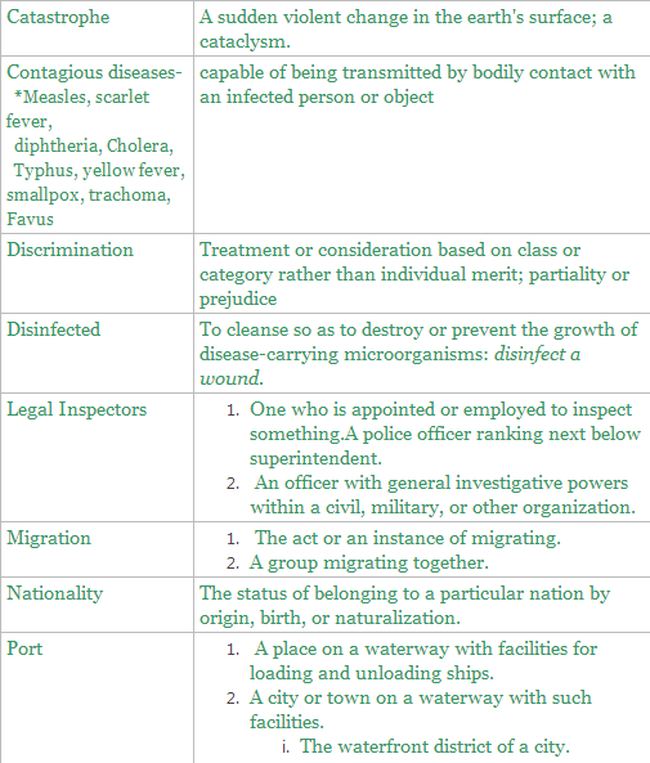Vocabulary of Immigration Terms
Alien: A person from another country who does not have the rights of a citizen
Citizen: A person who has all the rights and freedoms of a country—to work, vote, etc.
Deportation: Removal of an alien from a country, often because they arrived illegally
Depression: A time of low wages and few jobs. The Great Depression started in 1929.
Emigration: To leave one’s country forever
Greenhorn: (Insult) An immigrant not familiar with the ways of his or her new country
Immigration: To move permanently to a new country. People who do this are immigrants.
Literacy: Being able to read and write. After 1917, required for alien men entering the
U.S.
Passport: A document that allows a person to enter and leave a foreign country
Pogrom: Attacks against Jewish communities in Russia during the 1800s-early 1900s
Quarantine: (verb) To isolate a sick person in order to stop a contagious disease from
spreading. (noun) A place for sick people, to keep them from spreading disease.
Quota: Any limit, set by law
Quota laws: Laws passed in the 1920s to restrict immigration based on nationality
Settlement house: A place that offers services for immigrants—classes, sports, job counseling
Ship manifest: A list of passengers on a ship. Includes name, age, destination, place of origin.
Steerage: “Third-class” passengers on a ship who traveled below deck in crowded rooms
Tenement: An apartment building with low standards of health, safety and comfort
Trachoma: A very contagious eye infection that can lead to blindness if not treated.
Vermin: Small, harmful insects, such as fleas or lice, that thrive in unsanitary conditions
Visa: A document that allows a person to go to the border of a country and ask an
immigration officer for permission to enter.
Alien: A person from another country who does not have the rights of a citizen
Citizen: A person who has all the rights and freedoms of a country—to work, vote, etc.
Deportation: Removal of an alien from a country, often because they arrived illegally
Depression: A time of low wages and few jobs. The Great Depression started in 1929.
Emigration: To leave one’s country forever
Greenhorn: (Insult) An immigrant not familiar with the ways of his or her new country
Immigration: To move permanently to a new country. People who do this are immigrants.
Literacy: Being able to read and write. After 1917, required for alien men entering the
U.S.
Passport: A document that allows a person to enter and leave a foreign country
Pogrom: Attacks against Jewish communities in Russia during the 1800s-early 1900s
Quarantine: (verb) To isolate a sick person in order to stop a contagious disease from
spreading. (noun) A place for sick people, to keep them from spreading disease.
Quota: Any limit, set by law
Quota laws: Laws passed in the 1920s to restrict immigration based on nationality
Settlement house: A place that offers services for immigrants—classes, sports, job counseling
Ship manifest: A list of passengers on a ship. Includes name, age, destination, place of origin.
Steerage: “Third-class” passengers on a ship who traveled below deck in crowded rooms
Tenement: An apartment building with low standards of health, safety and comfort
Trachoma: A very contagious eye infection that can lead to blindness if not treated.
Vermin: Small, harmful insects, such as fleas or lice, that thrive in unsanitary conditions
Visa: A document that allows a person to go to the border of a country and ask an
immigration officer for permission to enter.

